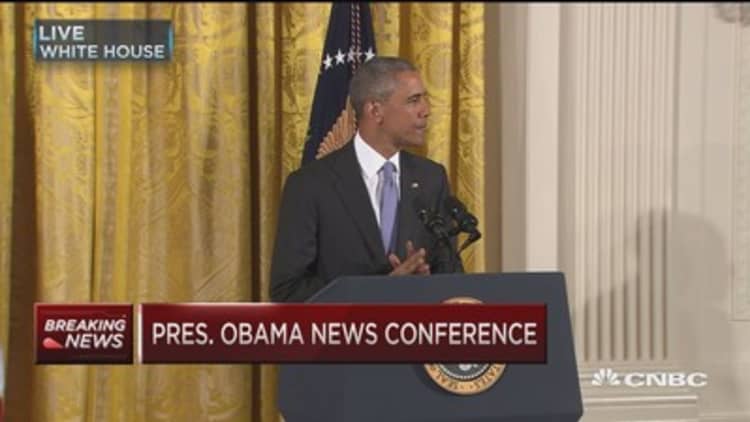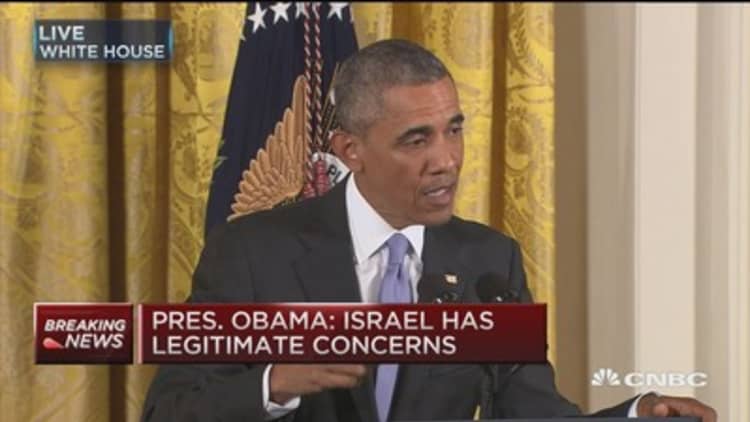A landmark agreement on Iran's nuclear program this week could lift sanctions that have crippled the country's economy, opening a nation with a young and educated population, the world's fourth-largest proven oil reserves, and factories badly in need of new equipment.
It all adds up to a bonanza for international businesses—with the notable exception, for now at least, of American firms.
While the deal would give much of the world access to Iranian markets, America's own sanctions that have prohibited U.S. citizens from investing in Iran for decades will remain in place. The language of the deal suggests that only foreign subsidiaries of U.S.-headquartered businesses would be granted licenses to transact with Iran, experts told CNBC.
In turn, that sets up a dilemma not only for President Barack Obama, but for all the 2016 White House contenders.
Read MoreThese Iranian industries could get a boost from deal
After years of painstaking negotiations and at great political cost, the Obama administration has created a means for foreign businesses to re-enter Iran—but U.S. law still sidelines all but the biggest American multinationals.
Even in the case of big U.S. corporations with foreign subsidiaries, any U.S. citizen employed by an overseas unit would likely be prohibited from participating in transactions with Iran unless granted permission by the Treasury Department's Office of Foreign Asset Controls, experts said.



Farhad Alavi, managing partner at Akrivis Law Group, said it's possible the administration will begin loosening restrictions around "lower-hanging fruit," though much depends on how U.S.-Iran relations take shape and how smoothly the agreement is implemented. But he was optimistic.
"I'm very comfortable saying the landscape of U.S. unilateral sanctions might change dramatically in the coming six to eight months," he said.
Read MoreInvestors rush to buy foreign stocks amid crisis
He noted, for instance, that the final deal would allow U.S. aircraft manufacturers to sell to Iranian airlines: "If they allow that, the case for allowing electric sockets and lounge chairs is not going to be as difficult to make."
However, Richard Nephew, a former lead sanctions expert for the State Department, said the provision on aircraft sales was ultimately included because Iran pushed for it specifically and should not be taken as a sign the administration will ease sanctions on other sectors.
That's because U.S. unilateral sanctions are enshrined in Clinton-era executive orders—as well as the 1996 Iran-Libya Sanctions Act—both of which are rooted in Iran's alleged support for terrorism and its human rights violations, not its nuclear program.
I think that the American companies will be welcomed in Iran. This is not a game for junior companies, and I call juniors anything below a billion-dollar market cap. This is a big-money game.Marin Katusaportfolio manager, on the oilfield services sector
Rolling back those measures in the near term would be political suicide, Nephew said, adding that "it is not something I see happening until Iran renounces terrorism and no longer violates its population's human rights."
The question of whether easing those other sanctions could become more politically palatable depends on the outcome of a congressional vote on the terms of the nuclear deal, said David Wolber, an associate in the international trade group at law firm Gibson, Dunn & Crutcher.
Read MoreFear not—VIX signals all-clear for stocks: Strategist
Congress has 60 days to review the Joint Comprehensive Plan of Action, after which it will vote up or down on the deal. Obama has said he will veto any "no" vote.
"If they just eke by, they may be a little more reticent to go gangbusters on other relief," he said. "If it's an easier fight—and no one is anticipating it will be—they may see that as a mandate to go forward."
Obama may also find allies in the private sector, and the issue will likely come up on the 2016 campaign trail, Wolber added. "As more people get wind of the nature of relief, I think you'll see some pressure from industry," he said.
And what about oil?
Probably Iran's most sought-after prize is its vast oil reserves.
Marin Katusa, a portfolio manager and author of the book "The Colder War," expects Russian, Chinese and Indian national oil companies to be major players, while Sunni Gulf states will be frozen out of Shiite Iran. The end of sanctions also presents an opportunity for international oilfield services firms such as Schlumberger.
But U.S.-based, internationally focused oil field services firms that operate overseas subsidiaries, such as Halliburton, are also poised to be early movers, he said.
"I think that the American companies will be welcomed in Iran," he said, adding, "This is not a game for junior companies, and I call juniors anything below a billion-dollar market cap. This is a big-money game."
Even if further U.S. sanctions relief finds support on Capitol Hill, risk-averse banks, particularly U.S. institutions, may not be on board, Wolber said. So-called snap-back provisions—which allow world powers to restore sanctions if Iran violates the terms of the deal—will also make banks hesitant to participate in transactions, he added.
"There may be a lag time in terms of what's allowed commercially and what's feasible via the financial system," Wolber said.


